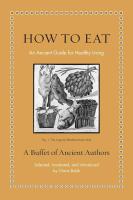
Princeton and Oxford (2025) h/b 242pp £14.99 (ISBN 9780691256993)
This book follows the conventions of the many very successful predecessors in the series: an informative 48-page introduction, locating ancient food in its cultural, dietetic, Mediterranean and literary context, providing some examples behind the principles of her translation, and followed by the Greek and Latin texts are on the left-hand page and the translation on the right, ending with Further Reading and Notes.
The passages are selected from a splendidly wide range of classical authors: relatively extended passages from Hippocrates, Diocles and Celsus, discussing seasonal eating, eating for lifestyle and eating for self-care, taking up one-third of the texts, are followed by what to eat, under the headings ‘Appetisers and Relishes’, ‘Vegetables and legumes’, ‘Grains’, ‘Dairy’, ‘Meat, poultry, and eggs’, ‘Fish and seafood’, ‘Compound dishes’, and ‘Fruits, nuts, and sweets’. These are covered by Galen (inevitably the star of the show by a country mile), Pliny the Elder, Dioscorides, Seneca the Younger, Apicius, Cato on agriculture, Hippocrates and Plutarch,
This all makes for a delightful as well as a fascinating read, made all the more enjoyable by the clarity of the translation. To give a taste of what is on offer, here are some amuse-bouches:
‘The radish is productive of flatulence; it is easy on the taste buds but not on the stomach; it causes burping. It is also diuretic and warming. It is good for the bowels if you have it after other food, when it is more helpful to digestion; but if you eat it before your meal, it makes your food come back up.’ (Dioscorides)
‘There is also something called sugar, being like a solid honey found on reeds in India and Arabia Felix, similar in structure to salt and crushed between the teeth in the same way as salt. It is good for digestion, good for the stomach; dissolved in water and drunk, it benefits an ailing bladder and the kidneys.’ (Dioscorides)
‘Of the whole of the natural world, the sea is the most destructive to the stomach, with so many varieties, so many dishes, so many flavours of seafood, who is high value tempts those who catch them into danger.’ (Pliny the Elder)
‘Oats: this is a food for beasts of burden, not for people’ (Galen)
‘Peel the best African sweet apples and soak them in milk. When they have drunk it up, put them in the oven at a low temperature, so they don't dry out. Take them out when they are hot, pour honey over them and prick them so that they drink it up. Sprinkle with pepper and serve.’ (Apicius)
Seneca’s famous rant on mixing up foods is a warning to us all: ‘Simple health came from simple causes: a wild multiplicity of choices yields a multiplicity of diseases… I recall once hearing tell of a celebrated casserole, in which a cook shop (hastening itself towards financial ruin) mixed together whatever was in fad with the elegant: cockles and muscles and oysters, interlaced with whole sea urchins and surrounded by deboned fillets of mullet. These days, one food at a time is disgusting: people like lots of flavours in one dish … vomited food could not be more mixed up … Don't be shocked that there are countless diseases: count the cooks instead’.
Peter Jones
